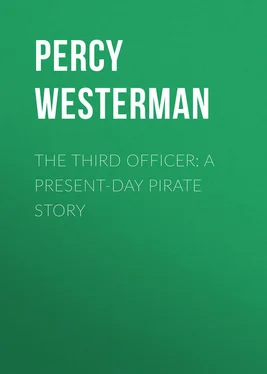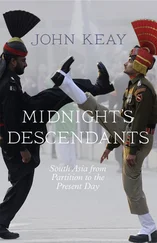Percy Westerman - The Third Officer - A Present-day Pirate Story
Здесь есть возможность читать онлайн «Percy Westerman - The Third Officer - A Present-day Pirate Story» — ознакомительный отрывок электронной книги совершенно бесплатно, а после прочтения отрывка купить полную версию. В некоторых случаях можно слушать аудио, скачать через торрент в формате fb2 и присутствует краткое содержание. Жанр: foreign_prose, на английском языке. Описание произведения, (предисловие) а так же отзывы посетителей доступны на портале библиотеки ЛибКат.
- Название:The Third Officer: A Present-day Pirate Story
- Автор:
- Жанр:
- Год:неизвестен
- ISBN:нет данных
- Рейтинг книги:5 / 5. Голосов: 1
-
Избранное:Добавить в избранное
- Отзывы:
-
Ваша оценка:
- 100
- 1
- 2
- 3
- 4
- 5
The Third Officer: A Present-day Pirate Story: краткое содержание, описание и аннотация
Предлагаем к чтению аннотацию, описание, краткое содержание или предисловие (зависит от того, что написал сам автор книги «The Third Officer: A Present-day Pirate Story»). Если вы не нашли необходимую информацию о книге — напишите в комментариях, мы постараемся отыскать её.
The Third Officer: A Present-day Pirate Story — читать онлайн ознакомительный отрывок
Ниже представлен текст книги, разбитый по страницам. Система сохранения места последней прочитанной страницы, позволяет с удобством читать онлайн бесплатно книгу «The Third Officer: A Present-day Pirate Story», без необходимости каждый раз заново искать на чём Вы остановились. Поставьте закладку, и сможете в любой момент перейти на страницу, на которой закончили чтение.
Интервал:
Закладка:
Their guards, too, had been removed. Evidently the pirates were now satisfied that the prisoners were no longer in a position to cause trouble; while in support of that theory a half-caste South American appeared and unbolted the dead-lights.
The flow of pure, balmy air through the now opened scuttles was like a draught of the sweetest nectar to the jaded and dishevelled men. There was a rush to see where the ship was lying, until at every scuttle two or three people were simultaneously trying to look out.
The Donibristle was lying in a circular and apparently completely landlocked harbour surrounded by tall cliffs. Further examination revealed a narrow gap, which, in turn, was fronted on the seaward side by a lofty ridge of rock, which, harmonizing with the cliffs of the island, presented at first sight an appearance of continuity. The cliffs were so high and close to the water's edge that from the Donibristle it was impossible to see what lay beyond – whether the ground rose to a still greater height, whether it was wooded or otherwise, or whether the island was of large or small extent.
About two cables away lay the Malfilio , also at anchor, while closer in shore were two vessels that Burgoyne rightly concluded were the ill-fated Alvarado and Kittiwake . A few sailing craft, bêche de mer traders seized by the pirates, were also to be seen, some of them lying aground with a heavy list.
It was now close on sunset. The tranquil waters of the harbour were shrouded in deepening shadow, while the horizontal rays of the setting sun bathed the summit of the eastern cliffs in a glint of reddish gold. Beyond that serrated line of sun-bathed cliff the sky was broken by three thin columns of smoke rising slowly in the still air.
"It's a snug berth at all events," observed Burgoyne, with a sailor's unerring instinct for a safe harbour. "But it would puzzle a stranger to find his way in."
"Will they set us ashore to-night, do you think?" asked Colonel Vivian.
Before Alwyn could reply the door was thrown open, and the engineer officers of both watches entered. That was a sign that their work in the engine-room was finished.
In the dim light no one noticed that Withers was not with them, but that instead there was a stranger, a tall, slender fellow of almost Withers's height and build, rigged out in the company's uniform, and with the peaked cap raked jauntily over the left eye. And until the "fellow" went straight up to the Colonel and took hold of his hands, even Burgoyne failed to recognize Hilda Vivian.
"We couldna let the wee lassie bide there," declared Angus apologetically, as if he were ashamed of having brought her along. "An' ye ken fine why."
"And where's Withers?" asked Burgoyne.
The old Scot shook his head.
"A' would do it," he declared, and went on to explain that the Second Engineer had insisted in donning a fireman's boiler-suit and giving his uniform to Miss Vivian.
"An' in the gloamin' they'll no ken the difference," he concluded.
"So far so good," soliloquized Alwyn. "But in daylight there may be quite a different story. The rascals have seen Withers and the other fellow going in and out of the engine-room. They'll twig a strange officer in a trice, I'm afraid."
But a glance at Hilda convinced him that running the risk had its compensations. The girl, even in her sorrow at her mother's death, was happy at being reunited to her father – her sole surviving relative. Clearly she was taking little or no thought for the morrow.
When it became a practically assured fact that the prisoners were to remain on board at least another night, there was general activity on the part of all the able-bodied men, with one exception, to fix up Miss Vivian in her new quarters. Willing hands quickly cleared out – it could not truthfully be said "cleaned out" – one of the cabins for her use, making far less fuss about having to sleep uncomfortably crowded than they had when they had fifteen hundred cubic feet more space.
The exception was Jules Miles, the Canuk bagman. At daybreak the survivors of the Donibristle's original crew were ordered on deck. Evidently the pirates were in a desperate hurry, for the Malfilio was lying with steam raised ready to proceed to sea. During the night she had coaled, receiving her coal from the captured Alvarado .
So, without even the formality of a search, the prisoners were sent ashore, the wounded being carried in strips of canvas cut from discarded awnings.
The undamaged boats of the Alvarado were employed to convey the prisoners from the Donibristle to the beach, and in consequence the journey was a painful one for the wounded.
But in the hasty performance of the operations Hilda Vivian escaped detection, and once again Burgoyne, in his capacity of senior unwounded officer, thanked Heaven that so far the villainous pirates had so far failed to penetrate the deception. Incidentally he was thankful that the prisoners had had no opportunity to wash during their four days incarceration. Their faces were black with the grime of battle, and thus Hilda Vivian was furnished with an additional disguise.
On landing, the Donibristle's crew were formed up in a hollow square, with armed guards patrolling the outer face of the formation. Here they were kept in suspense for more than a quarter of an hour, until the arrival of the pirate captain, Don Ramon Porfirio, attended by his lieutenants, Pablo Henriques and Black Fritz Strogoff.
Ramon Porfirio was a Bolivian by birth, but had spent most of his time since the age of sixteen in various seaports of Chili and Peru. He was about thirty-five years of age, of medium height, and inclined to corpulence. His features were remarkable, his face being round and flabby; but instead of the broad short nose usually associated with this type of countenance his nasal organ was very pronounced, and beaked like a parrot's. His hair, bluish black and liberally oiled, hung a good six inches below the back of his gilt-braided cap. With the exception of closely-cropped side-whiskers he was clean shaven, although the bluish tint of the lower part of his face pointed clearly to the fact that he had not renewed his acquaintance with the razor that morning.
The pirate captain was rigged out in the undress uniform of an admiral of the Imperial Russian Navy. The tarnished buttons still displayed the double-headed eagle of the Romanoffs; the salt-stained blue coat was considerably the worse for wear. Burgoyne found himself wondering what had been the fate of the original wearer of the uniform, and by what roundabout way it had come into the possession of Ramon Porfirio.
Pablo Henriques requiring no further introduction, it will be necessary only to portray the third pirate officer, "Black" Fritz Strogoff.
He was short in stature, being only about five feet four inches, and grotesquely broad in proportion to his height. He had hardly any neck, literally speaking, although figuratively he possessed plenty. His features were swarthy, while by a curious contrast his hair was of a light straw colour. In point of age he was the eldest of the three. Although the date of his birth was unknown to him, he was fond of announcing that he entered the University of Dorpat in 1893; so, assuming him to be seventeen or eighteen at that time, he was now about forty-four or forty-five.
He could speak three languages fluently – Russian, German, and Spanish – and had a useful knowledge of English, French, and some of the dialects of Eastern Asia. In the days of the Russian Empire he had experienced the horrors of Siberia. During the war he had played no unimportant part in the intrigue between Soviet Russia and Germany. Not receiving what he deemed to be adequate reward from Lenin and Trotsky, he made his way, via Vladivostok, to one of the South American republics, where he came in contact with Ramon Porfirio.
Читать дальшеИнтервал:
Закладка:
Похожие книги на «The Third Officer: A Present-day Pirate Story»
Представляем Вашему вниманию похожие книги на «The Third Officer: A Present-day Pirate Story» списком для выбора. Мы отобрали схожую по названию и смыслу литературу в надежде предоставить читателям больше вариантов отыскать новые, интересные, ещё непрочитанные произведения.
Обсуждение, отзывы о книге «The Third Officer: A Present-day Pirate Story» и просто собственные мнения читателей. Оставьте ваши комментарии, напишите, что Вы думаете о произведении, его смысле или главных героях. Укажите что конкретно понравилось, а что нет, и почему Вы так считаете.












